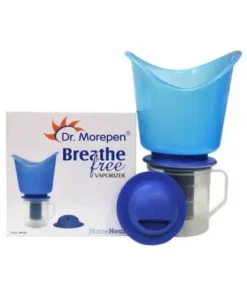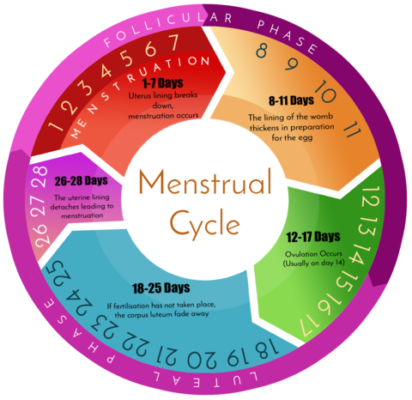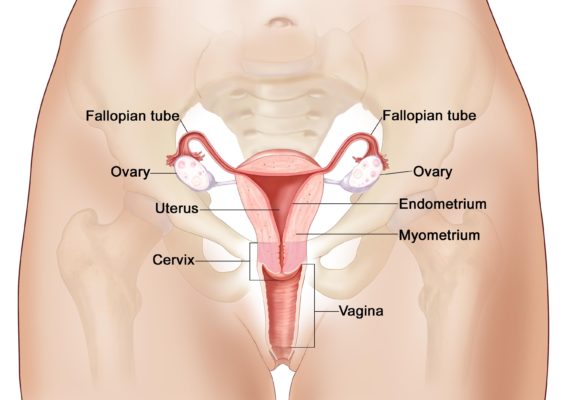What are periods?
It’s what happens when your body is mature enough to have a baby. Every month, the lining of your uterus (womb) gets thicker with tissue and your ovaries release an egg (called an ovum). If a sperm fertilizes the egg, the tissue stays where it is to help with pregnancy. But if the egg isn’t fertilized, your body sheds the tissue through the vagina. That tissue is the blood you see and this monthly process is called menstruation.
When do periods start?
Most girls start getting signs of their first period and start menstruating between 11 and 14 years old, but it could happen any time between age eight and 16. Remember that everyone is different, so a normal age for your friends might not be the same for you. You’ll have periods until you’re around 50 years old when you start something called the menopause. That’s when your body stops menstruating and can’t have children any more.
What are the signs of your first period?
You know those changes we were talking about? If you’ve felt your breasts growing larger, if you’ve started growing pubic hair and if you’ve noticed a white discharge in your underwear, then it won’t be long before your body experiences its first period. When it starts, you might also experience premenstrual syndrome (PMS). This causes symptoms like period pain (cramps in your tummy), moodiness, bloating, backache, weight gain and skin break outs.
How long does your first period last?
The average time to bleed is between four or five days, but your period could last from three to eight days. Again, everyone’s different. Your period is part of your menstrual cycle, which starts on day one of bleeding and ends the day before your next period begins. The average cycle is 28 days but it may be shorter or longer.
What is menstruation?

Menstruation is the technical term for getting your period. About once a month, females who have gone through puberty will experience menstrual bleeding. This happens because the lining of the uterus has prepared itself for a possible pregnancy by becoming thicker and richer in blood vessels. If pregnancy does not occur, this thickened lining is shed, accompanied by bleeding. Bleeding usually lasts for 3-8 days. For most women, menstruation happens in a fairly regular, predictable pattern. The length of time from the first day of one period to the first day of the next period normally ranges from 21-35 days.
What is normal bleeding?
There is a range of normal bleeding – some women have short, light periods and others have longer, heavy periods. Your period may also change over time.
Normal menstrual bleeding has the following features:
- Your period lasts for 3-8 days
- Your period comes again every 21-35 days (measured from the first day of one period to the first day of the next)
- The total blood loss over the course of the period is around 2-3 tablespoons but secretions of other fluids can make it seem more
What is ovulation?

Ovulation is the point in the menstrual cycle where one little egg travels from your ovary (where it lives with thousands of other eggs) into the body’s fallopian tubes.
Ovulation typically lasts one day and occurs in the middle of a woman’s menstrual cycle, about two weeks before she expects to get her period.
Can I have sex during my period? Can I get pregnant during my period?
According to The American College of Obstetricians and Gynecologists, most women experience a 28-day menstrual cycle.
This cycle lasts from the first day of menstrual bleeding to the day before bleeding begins the following month. The length of the cycle varies between individuals, but is usually between 26–32 days long, with 28 days being the average.
The most fertile time of the menstrual cycle is between days 8 and 19.
This is the time when the egg is released from the ovary during ovulation and travels down the fallopian tube where fertilization occurs. If fertilized by a sperm, the egg makes its way to the uterus for implantation.
Following ovulation, an egg can stay alive and viable in a woman’s fallopian tube for 24 hours.
so in this period sperm enters during sex, sperm can remain viable in your vagina for up to five days, so pregnancy is possible.
 Navratna Ayurvedic Oil 300ml
1 × 228.00 ₹
Navratna Ayurvedic Oil 300ml
1 × 228.00 ₹ Supradyn Naturals Tablets with Iron, Ashoka and Shatavari-Bayer Pharmaceuticals Pvt Ltd
1 × 313.00 ₹
Supradyn Naturals Tablets with Iron, Ashoka and Shatavari-Bayer Pharmaceuticals Pvt Ltd
1 × 313.00 ₹ Iodex Ultra Gel+ 50GM-GlaxoSmithKline Consumer Healthcare
1 × 159.00 ₹
Iodex Ultra Gel+ 50GM-GlaxoSmithKline Consumer Healthcare
1 × 159.00 ₹ Dr Morepen Breathe Free Vaporizer VP 06-Morepen Laboratories Ltd
1 × 350.00 ₹
Dr Morepen Breathe Free Vaporizer VP 06-Morepen Laboratories Ltd
1 × 350.00 ₹ HIMALAYA Wellness AyurSlim Weight Management Capsule
2 × 325.00 ₹
HIMALAYA Wellness AyurSlim Weight Management Capsule
2 × 325.00 ₹ Sugar Free Gold Plus Sweetener 500 Pellets-Zydus Wellness Product Ltd
2 × 299.00 ₹
Sugar Free Gold Plus Sweetener 500 Pellets-Zydus Wellness Product Ltd
2 × 299.00 ₹ Brufen Power Metered Pain Relief Sprays 40gm-Abbott
1 × 171.00 ₹
Brufen Power Metered Pain Relief Sprays 40gm-Abbott
1 × 171.00 ₹ Electric Heating Bag
1 × 399.00 ₹
Electric Heating Bag
1 × 399.00 ₹ Scalpe Plus Anti Dandruff Shampoo_GLENMARK
1 × 299.00 ₹
Scalpe Plus Anti Dandruff Shampoo_GLENMARK
1 × 299.00 ₹ Moov Cool Therapy Gel 20GM-Reckitt Benckiser Healthcare Pvt. Ltd.
1 × 99.00 ₹
Moov Cool Therapy Gel 20GM-Reckitt Benckiser Healthcare Pvt. Ltd.
1 × 99.00 ₹ Horlicks Womens Plus Chocolate
1 × 349.00 ₹
Horlicks Womens Plus Chocolate
1 × 349.00 ₹
 Navratna Ayurvedic Oil 300ml
Navratna Ayurvedic Oil 300ml  Supradyn Naturals Tablets with Iron, Ashoka and Shatavari-Bayer Pharmaceuticals Pvt Ltd
Supradyn Naturals Tablets with Iron, Ashoka and Shatavari-Bayer Pharmaceuticals Pvt Ltd  Iodex Ultra Gel+ 50GM-GlaxoSmithKline Consumer Healthcare
Iodex Ultra Gel+ 50GM-GlaxoSmithKline Consumer Healthcare  Dr Morepen Breathe Free Vaporizer VP 06-Morepen Laboratories Ltd
Dr Morepen Breathe Free Vaporizer VP 06-Morepen Laboratories Ltd  HIMALAYA Wellness AyurSlim Weight Management Capsule
HIMALAYA Wellness AyurSlim Weight Management Capsule  Sugar Free Gold Plus Sweetener 500 Pellets-Zydus Wellness Product Ltd
Sugar Free Gold Plus Sweetener 500 Pellets-Zydus Wellness Product Ltd  Brufen Power Metered Pain Relief Sprays 40gm-Abbott
Brufen Power Metered Pain Relief Sprays 40gm-Abbott  Electric Heating Bag
Electric Heating Bag  Scalpe Plus Anti Dandruff Shampoo_GLENMARK
Scalpe Plus Anti Dandruff Shampoo_GLENMARK  Moov Cool Therapy Gel 20GM-Reckitt Benckiser Healthcare Pvt. Ltd.
Moov Cool Therapy Gel 20GM-Reckitt Benckiser Healthcare Pvt. Ltd.  Horlicks Womens Plus Chocolate
Horlicks Womens Plus Chocolate 

